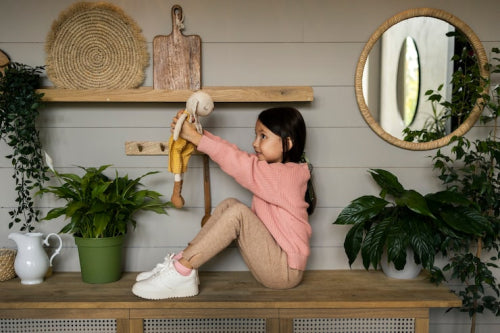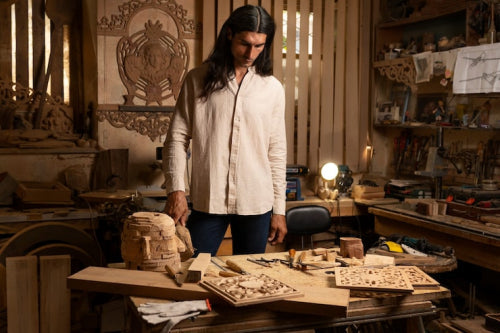Picture stepping into a modern apartment in Bangalore, where each chair, table, and shelf seems to whisper the personal narrative of its owner. This isn't mere decor it's a symphony of form and function, meticulously orchestrated through commissioned furniture. In India's vibrant urban landscapes, this approach is reshaping how spaces come alive, drawing design professionals into its fold with irresistible allure.
Mass-market furniture lacks heart, filling rooms with bland, short-lived pieces. Frequent breakdowns spark frustration, as replacements erode style and sentiment. At MMC Wood Creations, Udaipur artisans shape heirloom furniture with enduring craftsmanship and cozy elegance, creating pieces that echo your identity, ensuring your home radiates warmth and timeless connection. Shop Now!
Why Design Professionals Choose Commissioned Furniture for Custom Projects
Delving into the burgeoning world of bespoke furniture and its benefits for interior designers and architects in key Indian cities such as Bangalore, Mumbai, Jaipur, Chennai, Kolkata, Hyderabad, Pune, and Ahmedabad. In today's design realm, where individuality is paramount, professionals are ditching generic offerings for tailor-made masterpieces that infuse environments with character and purpose. This evolution is far from whimsical; it's supported by robust market dynamics. Recent analyses show that the global customized furniture market was valued at USD 35.30 billion in 2024, with projections indicating growth from USD 39.55 billion in 2025 to USD 98.27 billion by 2033, at a compound annual growth rate (CAGR) of 12.05% throughout the forecast period. This impressive trajectory stems from consumer's escalating appetite for distinctive, ergonomic, and versatile furnishings. The explosion of e-commerce platforms worldwide has further accelerated sales in this sector, while cutting-edge technologies including computer-aided design (CAD) software, augmented reality (AR), virtual reality (VR), and artificial intelligence (AI) are paving the way for innovative customization possibilities. At its essence, customized furniture encompasses pieces meticulously crafted to align with a customer's specific needs, preferences, spatial constraints, and aesthetic visions, allowing choices in materials, dimensions, colors, finishes, and designs that mass production simply can't match.
So, what draws architects and interior designers in bustling metropolises like Mumbai's skyscrapers or Jaipur's historic abodes to these bespoke creations? It boils down to unparalleled precision in fulfilling client expectations. Standard factory-made items are often hampered by uniform dimensions and styles, leaving gaps in functionality or flair. Commissioned alternatives, however, offer boundless adaptability be it resizing a dining set for a snug Pune terrace or weaving eco-friendly cane elements that resonate with Chennai's seaside ambiance. Such versatility not only distinguishes projects but also cultivates lasting client relationships in fiercely competitive arenas. Moreover, as urban dwellers increasingly prioritize sustainability and longevity, these custom solutions enable the integration of durable, locally sourced materials that stand the test of time.
Emerging Trends in Commissioned Furniture
The furniture design arena is transforming at a breakneck pace, particularly within India's major urban centers. In tech hubs like Bangalore and Mumbai, where innovative minds abound, the move toward personalization is unmistakable. Wealthy inhabitants, buoyed by expanding incomes, are on the hunt for furnishings that echo their unique identities rather than fading into anonymity. Envision enduring wooden consoles that defy passing fads or resilient outdoor ensembles suited to Hyderabad's muggy conditions, all while remaining accessible for routine living.
This movement dovetails with wider shifts in buyer behavior. Individuals are no longer merely acquiring items; they're committing to enduring value. Timeless aesthetics that merge aspirational elegance with everyday utility are surging in popularity, especially in niches like cane and wooden furnishings, which dominate searches on social media and online marketplaces. For example, in Ahmedabad, designers report a marked uptick in orders for custom outdoor items engineered to endure the area's dry heat, all while exuding a sophisticated, trend-proof charm. Industry surveys reinforce this: 42% of consumers favor brands that offer personalization options, with 71% seeking tailored solutions for bathrooms, 43% for bedrooms, and 38% for home offices. These preferences underscore a deeper yearning for spaces that feel authentically personal.
Supporting data highlights the momentum. The spread of digital marketplaces has democratized access to customization, empowering Kolkata-based designers to partner with craftspeople from afar. The influence of e-commerce is profound it has not only spiked transactions but also rolled out interactive tools for real-time previews of modifications. Consequently, commissioned furniture has shed its elite-only tag, emerging as an essential for astute homeowners in these locales. Looking regionally, the Asia-Pacific area commands the largest share, propelled by swift urbanization, demographic booms, rising affluence, and evolving lifestyles in nations like India. India's retail e-commerce sector is on a strong upward trajectory, with rapid digital adoption and expanding consumer bases fueling demand. This shift is significantly boosting interest in customized furniture, as shoppers increasingly seek personalized pieces that align with evolving tastes and lifestyles.Technological strides, such as AR visualization apps from giants like IKEA, further streamline the process, making bespoke designs more approachable than ever.
Real-World Examples: Commissioned Furniture in Action
Let's ground this in reality, where concepts translate to tangible outcomes. Consider a high-end residential development in Bangalore, a metropolis brimming with creativity. Designers here turned to commissioned wardrobes and loungers that meshed flawlessly with the building's sleek, modern lines. The secret lay in material and size versatility, which amplified both visual appeal and practicality without cluttering the area. Initiatives like these demonstrate how tailor-made elements transform standard interiors into bespoke havens that resonate on a personal level.
Now, pivot to Pune's hospitality scene, where small hotels are revolutionizing guest experiences. During a standout renovation, bespoke bar seating and relaxation chairs fashioned from sturdy timbers and canes took center stage. These aligned impeccably with the venue's sustainable ethos, earning accolades for their one-of-a-kind vibe that off-the-rack alternatives couldn't touch. Beyond branding, this strategy tackled real-world demands, such as robust outdoor configurations resilient against the heavy rains typical of neighboring Mumbai. Such applications illustrate the broader potential of commissioned work in commercial settings.
These aren't outliers. In Jaipur, celebrated for its craft legacy, professionals craft items blending age-old patterns with contemporary structures, yielding fusions that captivate international audiences. Over in Chennai, seaside ventures frequently incorporate airy, moisture-resistant cane designs, showcasing how personalization addresses local environmental hurdles while offering enduring elegance. Broader market moves echo this: In August 2020, Indian firm WoodenStreet raised USD 3.0 million in funding to expand its custom offerings, signaling investor confidence. Similarly, IKEA's December 2023 announcement of online sales in Gurugram, followed by a physical outlet, underscores the push toward accessible bespoke solutions in India. More recently, in July 2024, ABC Carpet & Home launched an online custom line with its Cobble Hill collection, enhancing digital-physical integration, while Shalin Designs debuted a millwork drafting service in January 2024. These instances highlight the trend's vitality and adaptability across contexts.
Key Challenges and Limitations of Commissioned Furniture
Naturally, every advancement carries obstacles. Pricing stands out as a primary concern. Producing one-off items requires expert craftsmanship and superior resources, inflating costs. In budget-aware zones like Hyderabad and Chennai, professionals must navigate these outlays against client finances, frequently emphasizing the long-term payoff of robustness and classic style. As one seasoned designer observes, the expense reflects an investment in pieces destined for longevity, not quick obsolescence.
Lead times pose another hurdle. Diverging from ready-stock goods, bespoke processes necessitate endurance from conceptual drafts to completion, spans can extend over months. This complicates urgent undertakings in Ahmedabad or Kolkata, where timelines are unforgiving. Supply chain issues, such as procuring exotic timbers or syncing with remote specialists, compound the intricacies, demanding meticulous planning to mitigate delays.
Craftsperson scarcity adds to the mix. While Jaipur teems with talent, aligning traditional expertise with cutting-edge requirements can prove challenging. Newer entrants to the market, despite their fresh status, inject vitality and novel methods, dispelling doubts about novice standing through demonstrated excellence in cane, wood, and exterior categories. Astute designers collaborating with these innovators discover that innovation yields distinctive, cost-effective alternatives that hold their own against veterans, broadening the field's accessibility.
Opportunities and Business Impacts of Commissioned Furniture
On the brighter side, prospects abound. For design experts, curating bespoke offerings forges a compelling unique selling proposition. In Mumbai's ruthless property market, those providing personalized touches foster devotion, converting singular engagements into enduring partnerships. The core is distinction delivering that irreplaceable personalization that elevates endeavors above the ordinary.
Harnessing regional skills magnifies potential. Kolkata's textile arts or Jaipur's carpentry prowess can imbue creations with cultural richness, luring patrons who cherish genuineness. Eco-considerations loom large; in environmentally attuned Chennai and Hyderabad, selections favor indigenous, hardy substances that lessen ecological footprints. This resonates with sustainability-focused buyers and bolsters local economies through artisan support.
From a commercial standpoint, the implications are vast. Bespoke furniture unlocks avenues for upscale valuations and broader alliances. With Pune and Bangalore's markets swelling with prosperous patrons, adepts in this domain secure sustained triumphs, leveraging the sector's anticipated climb toward nearly USD 100 billion by 2033. Europe's established scene, with its artisanal traditions and brands like IKEA, offers inspirational models, while APAC's dominance fueled by India's e-commerce surge promises exponential expansion for forward-thinking professionals.
Expert Insights: Why Commissioned Furniture is Here to Stay
commissioned furniture isn't merely enduring it's flourishing amid India's energetic urban tapestry. Authorities concur: the quest for customized interiors in these hubs will only escalate. Millennials and Gen Z, pursuing distinctiveness in homogenized cityscapes, are the catalysts. From Bangalore's innovation leaders to Mumbai's artistic souls and Hyderabad's business trailblazers, all yearn for environments that echo their drives.
Gazing forward, the coming years herald greater ingenuity. As technology refines workflows and online channels level the playing field, tailor-made furnishings will grow increasingly obtainable. Design trailblazers who evolve adopting budget-friendly, resilient choices from experts in cane, timber, and al fresco designs will spearhead the movement. In an era of uniformity, bespoke craftsmanship delivers the paramount advantage: singularity that persists through time.
Frequently Asked Questions
What are the main benefits of commissioned furniture for interior designers and architects?
Commissioned furniture offers design professionals unparalleled precision in meeting client expectations through boundless adaptability in materials, dimensions, colors, and finishes that mass production cannot match. It allows designers to create distinctive projects that cultivate lasting client relationships while addressing specific spatial constraints and aesthetic visions. This approach is particularly valuable in competitive markets like Mumbai and Bangalore, where personalized touches help professionals stand out and secure sustained success.
How much is the customized furniture market expected to grow in the coming years?
The global customized furniture market was valued at USD 35.30 billion in 2024 and is projected to grow from USD 39.55 billion in 2025 to USD 98.27 billion by 2033, representing a compound annual growth rate (CAGR) of 12.05%. This impressive growth is driven by consumer's increasing demand for distinctive, ergonomic, and versatile furnishings, along with the expansion of e-commerce platforms and cutting-edge technologies like AR, VR, and AI that enhance customization possibilities.
What are the main challenges of choosing commissioned furniture over ready-made options?
The primary challenges of commissioned furniture include higher costs due to expert craftsmanship and superior materials, extended lead times that can span several months from concept to completion, and potential supply chain complexities when sourcing specialized materials or coordinating with remote craftspeople. However, many design professionals emphasize that these challenges are offset by the long-term value of durability, timeless style, and the ability to create truly unique spaces that resonate with clients on a personal level.
Disclaimer: The above helpful resources content contains personal opinions and experiences. The information provided is for general knowledge and does not constitute professional advice.
You may also be interested in: Tables
Mass-market furniture lacks heart, filling rooms with bland, short-lived pieces. Frequent breakdowns spark frustration, as replacements erode style and sentiment. At MMC Wood Creations, Udaipur artisans shape heirloom furniture with enduring craftsmanship and cozy elegance, creating pieces that echo your identity, ensuring your home radiates warmth and timeless connection. Shop Now!
Powered by flareAI.co




